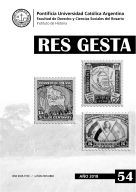Por favor, use este identificador para citar o enlazar este ítem:
https://repositorio.uca.edu.ar/handle/123456789/5810| Título: | Santa Cruz de la Sierra : de campañas separatistas y proyectos integracionistas, entre las postrimerías y la posguerra del Chaco (1935-1939) | Autor: | Pruden, Hernán | Palabras clave: | HISTORIA; GUERRA DEL CHACO; SEPARATISMO; HISTORIOGRAFIA | Fecha de publicación: | 2018 | Editorial: | Pontificia Universidad Católica Argentina. Facultad de Derecho y Ciencias Sociales del Rosario. Instituto de Historia | Cita: | Pruden, . Santa Cruz de la Sierra : de campañas separatistas y proyectos integracionistas, entre las postrimerías y la posguerra del Chaco (1935-1939) [en línea]. Res Gesta. 2018, 54 Disponible en: https://repositorio.uca.edu.ar/handle/123456789/5810 | Resumen: | Resumen: Este artículo investiga la campaña que intentó que Santa Cruz se separe de Bolivia durante la Guerra del Chaco y la reacción consiguiente por parte de la intelectualidad cruceña que enfatizó su pertenencia a Bolivia. Tanto separatistas como integracionistas justificaron sus posturas con una lectura de la historia y con descripciones con argumentos étnicos sobre la población de Santa Cruz. Los separatistas enfatizaron la hermandad entre paraguayos y cruceños por compartir un origen guaraní. Los integracionistas negaron el parentesco con los indígenas de la zona y recalcaron su blancura. Analiza luego la confrontación en la posguerra del Chaco, en torno a la fundación del Partido Oriental Socialista (POS). En ese momento se encontraron dos formas de concebir la Nación. De un lado, el POS reafirmando las diferencias étnicas, históricas y geográficas del Oriente boliviano y elevándolas al rango de plataforma partidaria; del otro, el presidente Germán Busch y los nacionalistas que no admitían que un grupo de convencionales se reúna en torno a un partido priorizando la identidad regional por sobre la nacional. Explora entonces la forma en que "raza" e historia son utilizadas en relación a la cuestión de la pertenencia nacional. Abstract: This article investigates the campaign that tried to separate Santa Cruz from Bolivia during the Chaco War and the consequent reaction on the part of the Santa Cruz intelligentsia that emphasized its belonging to Bolivia. Both separatists and integrationists justified their positions with a reading of history and descriptions with ethnic arguments about the population of Santa Cruz. The separatists emphasized the brotherhood between Paraguayans and Santa Cruz for sharing a Guaraní origin. The integrationists denied the kinship with the indigenous people of the area and emphasized its whiteness. He then analyzes the confrontation in the post-war period of the Chaco, around the founding of the Socialist Oriental Party (POS). At that time two ways of conceiving the Nation were found. On the one hand, the POS reaffirming the ethnic, historical and geographical differences of the Bolivian East and elevating them to the rank of party platform; on the other, President Germán Busch and the nationalists who did not admit that a group of convention members would gather around a party prioritizing regional identity over national identity. Explore then the way in which "race" and history are used in relation to the question of national belonging. |
Cobertura Espacial: | Santa Cruz de la Sierra (Bolivia) SIGLO XX |
URI: | https://repositorio.uca.edu.ar/handle/123456789/5810 | ISSN: | 0325-772X 2525-0884 (online) |
Disciplina: | HISTORIA | Derechos: | Acceso Abierto | Fuente: | Res Gesta. 2018, 54 |
| Aparece en las colecciones: | RG - 2018 nro. 54 |
Ficheros en este ítem:
| Fichero | Descripción | Tamaño | Formato | |
|---|---|---|---|---|
| santa-cruz-sierra-campanas-separatistas.pdf | 598,94 kB | Adobe PDF |  Visualizar/Abrir |
Visualizaciones de página(s)
338
comprobado en 30-abr-2024
Descarga(s)
666
comprobado en 30-abr-2024
Google ScholarTM
Ver en Google Scholar
Este ítem está sujeto a una Licencia Creative Commons

